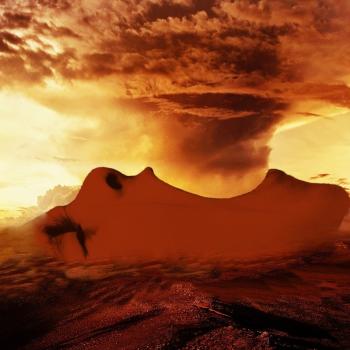We Mormons sometimes speak of our undergarments as giving us protection, but I doubt that many who speak that way are thinking of the folk beliefs that an internet search can turn up. Our underwear is not magic. It protects us by offering us a constant reminder of our covenants.
Elsewhere I have written:
[M]y wedding band is a symbol of my marriage. As a symbol, it is obviously connected to memory. However, though it serves to remind me that I am married, it is more than just a reminder.
What more could it be? . . .
[M]y wedding ring is a memorial of our relation because it does something for me in spite of myself. Even if I am not thinking of my marriage, the ring demands a certain attitude toward the world, a certain reverence and respect for Janice; it connects me to Janice even when I am not explicitly thinking of her. My wedding ring makes possible certain relations in the world by embodying those relations.
Said another way, my wedding ring gives order to my world: an order that relates me to my wife and to the rest of the world, an order that cannot be reduced to an intention to remember my marriage. (Faith, Philosophy, Scripture, pp.4-5)
Similarly, the garments I wear after my first experience in the temple relate me to God and to the world through the covenants I made there. They offer me protection by ordering the world differently, allowing me to see things differently than I would see them otherwise. That's a great thing, even a wonderful thing. But it isn't magic.
Another of the things that one can read on the internet or hear on some news channels: "Mormons believe they will someday have their own planet." I suppose that's one way to put LDS belief, but it also describes more of a folk belief than a real one. Indeed, I've rarely, perhaps never, heard another Mormon talk that way except as a joke.
Joseph Smith taught that the destiny of human beings is to become like God (D&C 132:20). We also believe "families are forever" (a common slogan among Latter-day Saints). Based on this belief, in the 19th century Brigham Young and others taught that we would become like the Father and create our own worlds. That appears to have been commonly believed then, but it is seldom taught today. I can't think of a time when I've heard an authority of the Church teach it. As I said, I can't think of a time I've heard it said that it wasn't part of a joke.
We don't know what it means to be like God, except that it is a glorious thing. Our belief is comparable in some ways to the traditional Orthodox belief in theosis. We know even less about what it means to have "a continuation of the seeds forever" (D&C 132:19). Most of us are satisfied to live with "I don't know" as the answer to what it means to become like God and to have an eternal family.
I've done no empirical survey, but my impression is that there may be Mormons who understand themselves to be ultimately the creator of a world, but it isn't a standard, common belief. It is more something left over from the 19th century. Few of us deny that belief, but few of us assert it either. Most of us stick with not knowing. Most of us are satisfied to believe "that same sociality which exists among us here will exist among us there, only it will be coupled with eternal glory" (D&C 130:2), and with not knowing the details of what that means.
As a Mormon not unlike lots of other Mormons, it is important to me to acknowledge the sacrifice that Jesus made for me and all other persons, and I must actively remember that he is our Messiah. I must pray often and read the scriptures. It is important to perform the service to which I have been called in my congregation. It is important that I take part in our monthly fast and, as part of my fast, make a generous donation for those in need. I need to live with my wife, children, and grandchildren in love. And it is important that the love I learn in my family go beyond its boundaries to my congregation, to other LDS congregations, to those of whatever religion, to all of humanity.
The sacred garments I wear remind me of those obligations more than they remind me of doctrines. What it means to become like God remains a mystery about which I don't think very much. Whatever it means will work itself out in my understanding in the eternities and has little to do with what it means to be a Mormon now, in the life I am presently living.





